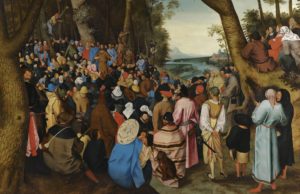Thoughts on Sunday’s Lessons for Dec. 9, 2018

Saint John the Baptist Preaching to the Masses in the Wilderness. Oil painting on oak by Pieter Brueghel the Younger (1564-1638). Galerie de Jonckheere, Paris. (Click image to enlarge.)
First Reading: Baruch 5:1-9
In our first reading, the minor prophet Baruch reflects a more familiar Isaiah passage: He tells Israel in exile to stop mourning, for God will lower the mountains and fill up the valleys to make level ground upon which Israel may walk safely home. In Sunday’s Gospel, we will hear Luke quote the Isaiah passage as a prophecy of John the Baptist. (This, by the way, is one of only two times in the three-year lectionary cycle that we’ll hear a reading from Baruch, one of the apocryphal books after the end of the Old Testament. Baruch, whose name is mentioned briefly in Jeremiah, was said to be a friend and scribe of that more famous prophet.)
Alternate First Reading: Malachi 3:1-4
In the second week of Advent, we turn from apocalyptic expectations of fear and foreboding to a more hopeful theme: A Messenger is coming to make the way ready for the Messiah. The minor prophet Malachi, whose name actually means “my messenger” in Hebrew, warns that God’s Messenger must cleanse the people with fire, making them pure and pleasing to God. “Who can endure the day of his coming?” the prophet sings (in words that Handel would make unforgettable 2,000 years later in The Messiah). “He is like a refiner’s fire!”
Alternate to the Psalm: Canticle 16 (Luke 1: 68-79)
In place of a Psalm today we sing a Canticle taken from Luke’s Gospel. These verses tell the story of John the Baptist’s father, Zechariah, a priest of the Temple. When Zechariah had refused to believe that his elderly wife, Elizabeth, had really become pregnant after an angelic visitation, God struck him mute. But his voice returned when he held the infant and named him John. This child, Zechariah declares, is to be a prophet like Abraham, the Messenger who will “go before the Lord to prepare his way.”
Second Reading: Philippians 1:3-11
The Christian community at Philippi in Greece, according to Luke’s account in Acts, was the first church formed by Paul in Europe as he traveled west from Asia Minor. This letter, written from a Roman prison several years later, is full of love and gratitude. In these verses near the beginning of the short letter, he offers greetings, love, thanks for their friendship and prayers for their well-being. Recalling how eagerly they had accepted the Gospel, Paul prays for this congregation’s continued spiritual growth and insight, which he hopes will lead them to a harvest of righteousness and justice in God’s love through Christ.
Gospel: Luke 3:1-6
Zechariah’s son John is a grown man now, and he has begun his public life as John the Baptist, a prophet crying in the wilderness along the Jordan river. Luke begins his account of John (which we’ll continue next week) with a detailed roster of Roman and Jewish leaders of the time, perhaps as a way to place the prophet in this historical setting for his readers decades later, after the death and resurrection of Jesus and the fall of the Temple. John the Baptist proclaimed a baptism of repentance for the forgiveness of sins, Luke tells us, quoting a prophecy of Isaiah as John’s call to “Prepare the way of the Lord … make his paths straight,” filling every valley and making every mountain and hill low so that all humanity may see God’s salvation.
